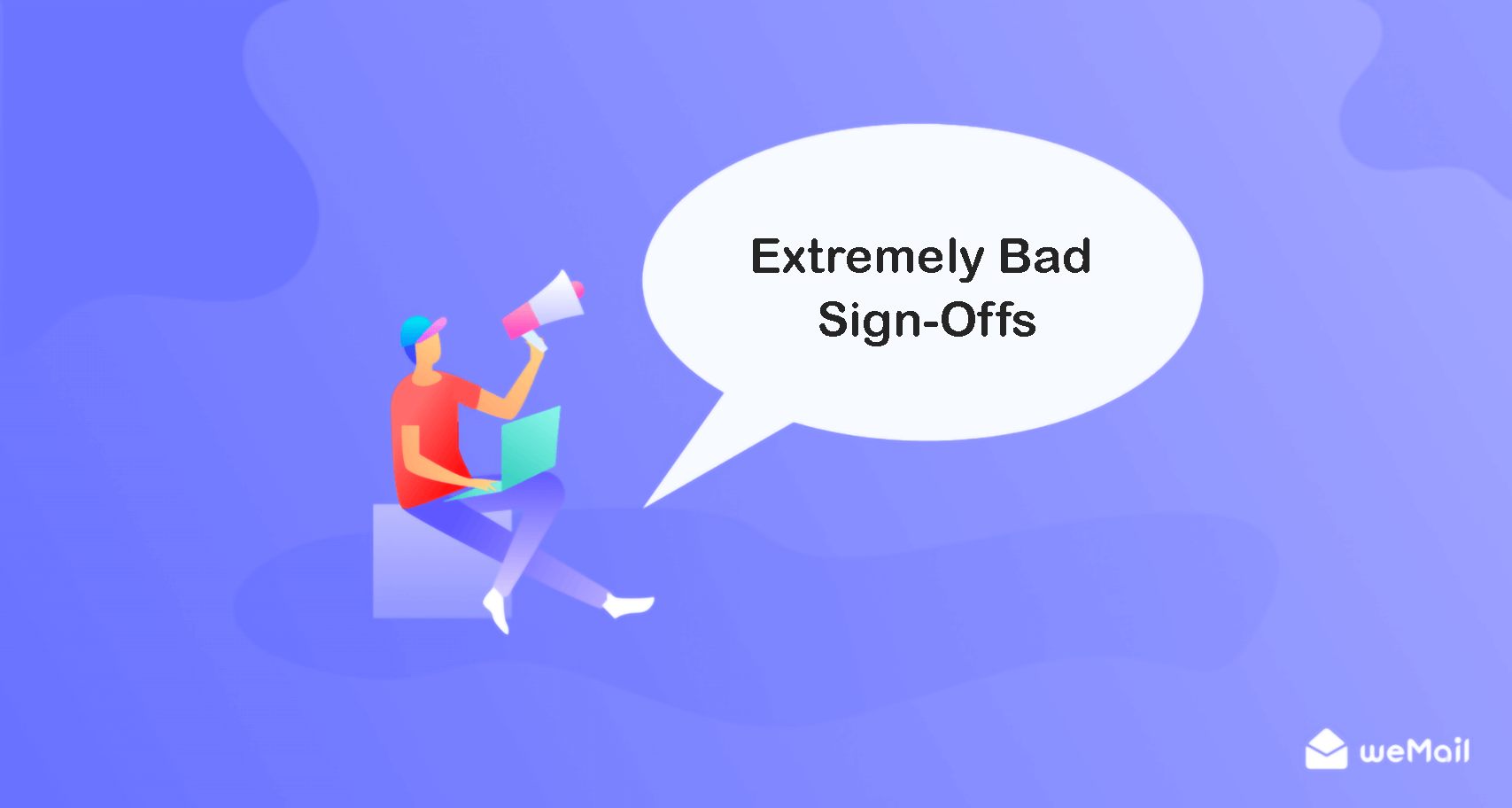How to End an Email in a Professional Way – Best and Worst Examples

The ability to close an email professionally can impact your communication value with customers, clients, and business partners. It’s equally important as the subject line and main body of an email. Still, many people are unaware of the fact and end up failing to create a long-lasting impression.
Therefore, you must choose the closing words wisely while writing an email. There’re certain best practices you can follow to ensure this. This article will cover a thorough discussion on how to end an email in a professional way with best practices. Let’s jump into it and learn the best.
Things to Include for Ending Emails in a Professional Way
You’d never want your identity gets vanish as soon as you’re done talking to someone through emails. You’ll definitely expect the person to remember you for a long time so he/she can instantly remember whenever you knock him/her next time.
There are certain elements you must include in every email to ensure that. We’ve pointed them out below. Keep reading them!
a. Closing Line/Phrase
It is the finishing sentence or words before the sign-off and signature section. It allows you to bid farewell, express gratitude, and reinforce your overall tone in the email. For example, I look forward to hearing from you, Thanks in advance, Let me know if you have any questions, etc.
b. Sign-Off
Sign-off is the final part of an email. It serves as a way to bid a formal or friendly farewell before concluding the email and pressing the send button. Some most common sign-off words are Sincerely, Thank you, Regards, Take Care, etc.

c. Name and Phone Number
The name and phone number are actually parts of the sign-off. They clarify who exactly has sent this email. It helps the email recipients remember the name of the email sender. Moreover, not adding the name is considered unprofessionalism, and receivers may ignore the email.
d. Signature
In the context of email, the signature doesn’t refer to any calligraphic name-art of the person. It typically contains the job title, social media links, and company logo. It’s a way of personal branding that adds an additional professional touch to the email. Learn how to make your brand stand out.
In the following parts of the write-up, we’ll explain to you the best practices in choosing words and phrases for the closing lines and sign-offs.
Best Closing Lines and Phrases for Professional Emails

A professional tone in email writing refers to the formal and respectful communication style appropriate for the business and professional environment. It conveys a sense of competence, authority, and courtesy to the email receivers. Below is a list of some sentences and phrases you can use to professionally end an email.
- Thank you for your time and kind attention to this matter.
- I look forward to hearing from you.
- I’m excited about the opportunity to work together.
- I am grateful for the opportunity to work with you.
- I am eager to collaborate and move forward with this project.
- If you need more information, feel free to reach me anytime.
- Thank you again for considering my proposal with your kind attention.
- Your feedback is important to us, and I welcome any suggestions you may have.
- I would appreciate your immediate attention to this matter.
- Please inform me if there is a more suitable time for us to discuss this.
- Please never hesitate to contact me again if you require any further clarification.
- I agree with your proposal and am ready to work whenever you want.
- I’ve attached my documents and will contact you by (date) if I haven’t heard from you by then.
- Please review my documents and let me know if you have any questions.
Closing Lines and Phrases You Must Avoid in Ending Professional Emails
I hope you can identify the ending sentence of a professional email from the above sentences. If you write the exact same sentence with a slight twist, they will lose their professional value. Below are some examples of sentences you should avoid in professional email writing.
- Thank you for your time and attention to this matter.
- I look forward to hearing from you soon.
- Should you have any further questions, please don’t hesitate to ask.
- I appreciate your prompt response.
- If you need any more information, reach out to me.
- Thank you for considering my input.
- I am ready to collaborate on this project.
- Your feedback is valuable, and I welcome any suggestions you have.
- I hope this information proves helpful.
- Let me know if there’s anything I can assist you with.
- I’m excited about the opportunity.
- Do not hesitate to contact me if you require any clarifications.
- Looking forward to the possibility of working together in the future.
- Inform me if there’s a more suitable time for us to discuss this.
Sign-Offs for Professional Emails

The sign-off is a vital component in the professional email communication process. Its primary purpose is to conclude the email politely, leaving a long-lasting impression. Besides, it’s an etiquette in modern-day communication. Take a look at some best sign-offs you can use in professional emails.
- Sincerely
- Regards
- Cordially
- Respectfully
- Best Wishes
- Respectfully
- Thank You
- Warm Regards
- Kind Regards
- All The Best
- Yours Faithfully
- Yours Sincerely
- Have a Great Day
- Thanks in Advance
- Wishing You All The Best
- Have a Wonderful Week
- Thanks for Your Kind Cooperation
Sign-Off Words and Phrases You Must Avoid in Professional Emails
Similar to the closing lines, here are some words and phrases you must avoid in the sign-offs of professional email. Because they are commonly used in informal and casual emails. Please, take a look at them in the following bullet-point list.
- Love
- Cheers
- Thank You
- Thanks a Lot
- Thnx or Rgrds
- Take Care
- Yours Truly
- Peace Out
- Later
- Adios
- Take It Easy
- Talk Soon
- Yours Forever
- Catch Ya Later
- Hope This Helps
In addition to these, you should avoid any short form of words in professional emails. For example, TTYL (talk to you later) and XOXO (hugs and kisses). Plus, avoid wordings coming from different languages in the sign-off. Such as Adios and Ciao are derived respectively from Spanish and Italian languages.
Don’t use them when you are writing a professional in the English language. You can use them unconditionally when crafting informal, funny, or casual emails. Explore email marketing ideas to boost your sales.
Extremely Bad Sign-Offs in Professional Emails

When you send emails from a particle device, sometimes that information is automatically added to the email sign-off. This causes a poor impression in a professional email. So, you must double-check the matter before email to someone. Extremely bad sign-offs look like.
- Sent from iPhone
- Sent from Laptop
- Sent from Smartphone
- Autocorrection doesn’t work.
- Please forgive any mistakes.
- Sent from [Location]
Best Examples of How to End an Email in a Professional Way
We will present several examples of how to end an email in a professional way for different scenarios so you can take inspiration. We’ll combine the closing lines and signoff mentioned above. Keep reading!
Applying for a Job Post
Thank you for considering my application. Looking forward to the possibility of discussing my qualifications further.
Sincerely
Jhon Doe
Experience Marketing Professional
[email protected]
00-123-456-789
Follow-Up Email
It was a pleasure speaking with you today. I appreciate your kind insights into this matter and look forward to hearing from you.
Best Regards
Jhon Doe
Project Manager
[email protected]
00-123-456-789
Business Proposal
Thank you for considering my proposal. Please reach out to me anytime if you require any further clarification and document support.
Yours Faithfully
Jhon Doe
Business Consulant
[email protected]
00-123-456-789
Project Updates
I wanted to share with you the last progress on the project. Your feedback is valuable to us, and we welcome any suggestions you may have.
Warm Regards
Jhon Doe
Project Lead
[email protected]
00-123-456-789
Meeting Invitation
I am cordially requesting you to accept the meeting invitation. Looking forward to a productive discussion on this matter.
Thanks in Advance
Jhon Doe
Affiliate Manager
[email protected]
00-123-456-789
Requesting Information
I am requesting the information for both of our benefits. Your assistance is greatly appreciated.
Yours Sincerely
Jhon Doe
Data Analyst
[email protected]
00-123-456-789
Rescheduling a Meeting
Thank you for understanding the need to reschedule the meeting. Let’s find a new date that works well for both of us.
Thanks for Your Kind Cooperation
Jhon Doe
Business Consultent
[email protected]
00-123-456-789
Acknowledgement
Thank you for your email. I have received the document. I will review them in a short time and let you know the updates.
Have a Wonderful Week
Jhon Doe
Legal Manager
[email protected]
00-123-456-789
Customer Support
We are really sorry for the inconvenience you experienced. Our support team is working to resolve the issue as soon as possible.
Sincerely
Jhon Doe
Customer Support Manager
[email protected]
00-123-456-789
Employee Onboarding
Welcome to our workplace! Please find the attached important documents for your onboarding process.
Warm Welcome
Jhon Doe
HR Manager
[email protected]
00-123-456-789
FAQ on How to End an Email in a Professional Way
So far, we have covered the theoretical aspects of how to end an email in a professional way. We’ll now answer some queries regarding the topic we commonly find on Google and different online forums.
What is a good professional email signature?
An email signature is a block that contains information about the email sender. A good professional email must include these elements: your name, job title, phone number, email address, website link, company logo, and social media icons.
How to write an email to my boss?
1. Set a clear subject line
2. Open with an appropriate greeting
3. Be direct to the point
4. Use clear language
5. Add a call-to-action (if necessary)
6. Proofread before sending it
What errors should you check when proofreading an email?
1. Spelling and grammar mistakes
2. Usage of punctuation marks
3. Subject line
4. Greetings and names
5. Formatting
6. Tone of language
7. Hyperlinks
8. Attachments
9. Signature
10. Confidential information
What is the difference between best regards and kind regards?
You must write best regards to the people you have a familiar relationship with. Write kind regards to the people in a higher position than you and also to those you don’t know.
When to write Sincerely and Regards in ending an email?
Sincerely is a very formal word. You must use it in job applications, formal business emails, and official communications. Regards is kind of a versatile word. You may use it with people you already know.
Final Thoughts!
Effective email communication has become a key factor for business and personal development. But still, most people don’t give equal importance to the finishing part of an email as much as they care about the subject line and the main body, which leaves a bad impression at the end.
So our purpose of this article was to present a complete guide on how to end an email in a professional way so you become more proficient in crafting perfect emailing. Let us know through the comment box if you have liked this article. Stay tuned for more interesting articles like this one, and keep learning.




2Comments
Teknik Elektro
What are the worst examples of email endings that should be avoided in a professional context?
Nahid Sharif Editorial Staff
In a professional context, it’s important to maintain a level of professionalism and respect in your email communications. A poorly chosen email ending can leave a negative impression on the recipient.
Here are some examples of email endings that should generally be avoided:
1. Overly casual endings
2. Emoticons and emoji overload
3. Inappropriate or insensitive phrases
4. Non-professional abbreviations
5. Confusing or overly informal language
6. Overly familiar or presumptuous endings
7. Arrogant or condescending closings
8. Unprofessional signatures
These are the things that you should avoid while sending emails. However, you can out our blog for more. Check out now – https://getwemail.io/blog